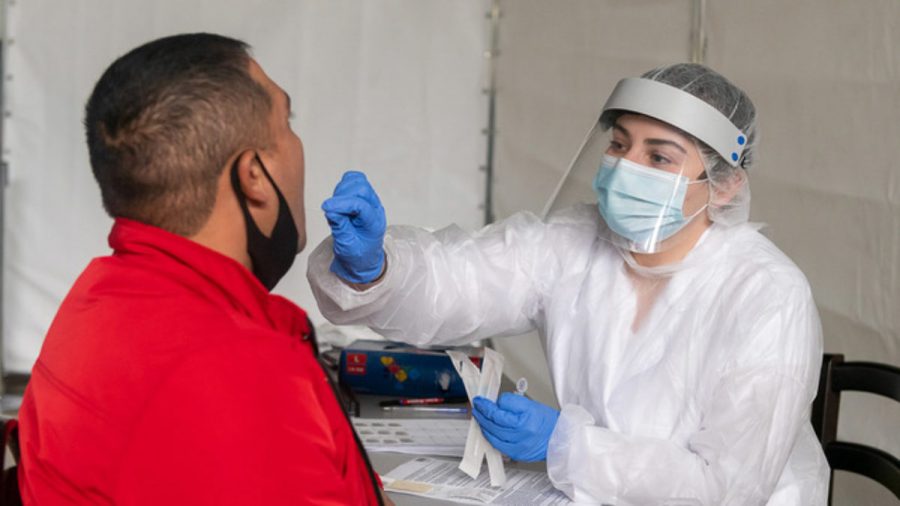COVID-19 Vaccine Rollout Hits Early Snags in Austin
Konstantin ‘KVentz’ Ventslavovic
Front line workers continue to give out COVID-19 tests. Patients who fall into the 1A and 1B category have been starting to get notified of available vaccines. Photo courtesy of Konstantin Ventslavovic.
January 14, 2021
Providers in Austin have started to notify patients who are eligible to receive the COVID-19 vaccine. Patients must fall into the 1A category which includes healthcare workers and first responders or the 1B category, which includes people over the age of 65 and those with chronic medical conditions. Those who will be receiving the vaccine will be required to take two separate shots, each 21 days apart. The first shot recognizes the virus and prepares the immune system, while the second shot strengthens the immune response.
According to CommUnityCare, a healthcare company associated with Central Health, the Texas Department of State Health Services has distributed 59,825 doses of the vaccine to the company. CommUnityCare has only received 2,100 of the doses but is prepared to receive more in the upcoming weeks. The Austin Regional Clinic has vaccinated over 6,000 healthcare workers and first responders. They have received a total of 7,000 doses and expect to have enough vaccines to last the rest of the week.
“People need to understand it takes more than a vaccine to get things back to the way they used to be,” front line worker Raisa Indira said. “We all need to be at home or be wearing our masks when we go outside. Our staff is currently busy with our drive-thrus for COVID-19 testing. We are open seven days a week and always see long lines from when we open to when we close.”
The vaccine, called BNT162b2, made by Pfizer/Biotech, uses the messenger RNA in human bodies to code a structure called the spike glycoprotein of the virus. The structure then attaches to cells and makes replicas that elicit an immune response to combat COVID-19. Safety and efficacy data have been published in the New England Journal of Medicine. According to the US Food and Drug Administration, the vaccine offers up to 95 percent protection against the virus.
President-elect Joe Biden is currently in the works of speeding up the vaccination process with his transition team. His plan includes establishing federally run vaccination sites, launching a national public awareness campaign to promote safety tips, and creating mobile units to travel the vaccines to rural and underserved areas. Additional details will be released after Mr. Biden’s inauguration on Wednesday, Jan. 20.
“The president-elect believes we must accelerate distribution of the vaccine while continuing to ensure the Americans who need it most get it as soon as possible,” TJ Ducklo, a spokesman for Mr. Biden’s transition said to the Washington Post. “He supports releasing available doses immediately, and believes the government should stop holding back vaccine supply so we can get more shots in Americans’ arms now.”
Although vaccines are starting to move along, Austin is still facing a huge problem amid the pandemic. According to Austin Public Health (APH) Director Stephanie Hayden, there are not enough vendors in Austin to help administer the vaccine. On top of that, Texas requires all providers to go through a long application process. They must be approved by the State, follow requirements and recommendations on how to allocate the vaccine, comply with CDC requirements for storing the vaccines, and report the doses to the State’s health system every 24 hours including any wasted, lost, or expired products.
Central Health President and CEO Mike Geeslin said to KXAN that he is working with APH and other large scale health companies to open up vaccination clinics “as quickly as possible” to serve those who are not qualified for the vaccine with low incomes and no health insurance. Ms. Hayden said in a briefing with the Travis County Commissioners Court that there are currently not enough doses of the vaccine for everyone in the 1A and 1B group and the general public should expect there to be vaccines available in the spring. For now, she advises Austin residents to continue practicing safety precautions and wear a mask.



